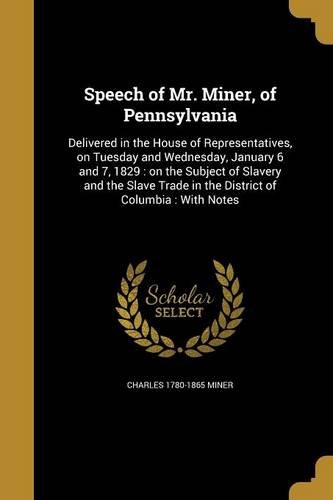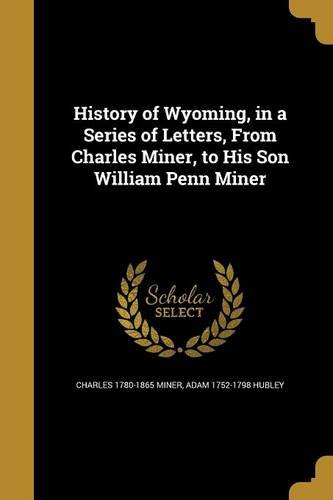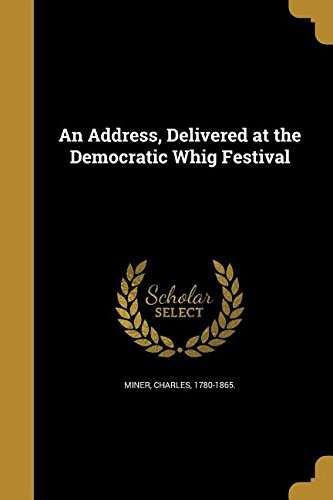Background
Charles Miner was the son of Seth and Anna (Charlton) Miner and a descendant of Thomas Miner (or Minor), who came to Massachusetts from Somersetshire about 1629. He was born in Norwich, Connecticut.



( This work has been selected by scholars as being cultur...)
This work has been selected by scholars as being culturally important, and is part of the knowledge base of civilization as we know it. This work was reproduced from the original artifact, and remains as true to the original work as possible. Therefore, you will see the original copyright references, library stamps (as most of these works have been housed in our most important libraries around the world), and other notations in the work. This work is in the public domain in the United States of America, and possibly other nations. Within the United States, you may freely copy and distribute this work, as no entity (individual or corporate) has a copyright on the body of the work. As a reproduction of a historical artifact, this work may contain missing or blurred pages, poor pictures, errant marks, etc. Scholars believe, and we concur, that this work is important enough to be preserved, reproduced, and made generally available to the public. We appreciate your support of the preservation process, and thank you for being an important part of keeping this knowledge alive and relevant.
https://www.amazon.com/Speech-Miner-Pennsylvania-Charles-1780-1865/dp/1373953403?SubscriptionId=AKIAJRRWTH346WSPOAFQ&tag=prabook-20&linkCode=sp1&camp=2025&creative=165953&creativeASIN=1373953403

( This work has been selected by scholars as being cultur...)
This work has been selected by scholars as being culturally important, and is part of the knowledge base of civilization as we know it. This work was reproduced from the original artifact, and remains as true to the original work as possible. Therefore, you will see the original copyright references, library stamps (as most of these works have been housed in our most important libraries around the world), and other notations in the work. This work is in the public domain in the United States of America, and possibly other nations. Within the United States, you may freely copy and distribute this work, as no entity (individual or corporate) has a copyright on the body of the work. As a reproduction of a historical artifact, this work may contain missing or blurred pages, poor pictures, errant marks, etc. Scholars believe, and we concur, that this work is important enough to be preserved, reproduced, and made generally available to the public. We appreciate your support of the preservation process, and thank you for being an important part of keeping this knowledge alive and relevant.
https://www.amazon.com/History-Wyoming-Letters-Charles-William/dp/136320033X?SubscriptionId=AKIAJRRWTH346WSPOAFQ&tag=prabook-20&linkCode=sp1&camp=2025&creative=165953&creativeASIN=136320033X

( This work has been selected by scholars as being cultur...)
This work has been selected by scholars as being culturally important, and is part of the knowledge base of civilization as we know it. This work was reproduced from the original artifact, and remains as true to the original work as possible. Therefore, you will see the original copyright references, library stamps (as most of these works have been housed in our most important libraries around the world), and other notations in the work. This work is in the public domain in the United States of America, and possibly other nations. Within the United States, you may freely copy and distribute this work, as no entity (individual or corporate) has a copyright on the body of the work. As a reproduction of a historical artifact, this work may contain missing or blurred pages, poor pictures, errant marks, etc. Scholars believe, and we concur, that this work is important enough to be preserved, reproduced, and made generally available to the public. We appreciate your support of the preservation process, and thank you for being an important part of keeping this knowledge alive and relevant.
https://www.amazon.com/Address-Delivered-Democratic-Whig-Festival/dp/1360099034?SubscriptionId=AKIAJRRWTH346WSPOAFQ&tag=prabook-20&linkCode=sp1&camp=2025&creative=165953&creativeASIN=1360099034

( This work has been selected by scholars as being cultur...)
This work has been selected by scholars as being culturally important, and is part of the knowledge base of civilization as we know it. This work was reproduced from the original artifact, and remains as true to the original work as possible. Therefore, you will see the original copyright references, library stamps (as most of these works have been housed in our most important libraries around the world), and other notations in the work. This work is in the public domain in the United States of America, and possibly other nations. Within the United States, you may freely copy and distribute this work, as no entity (individual or corporate) has a copyright on the body of the work. As a reproduction of a historical artifact, this work may contain missing or blurred pages, poor pictures, errant marks, etc. Scholars believe, and we concur, that this work is important enough to be preserved, reproduced, and made generally available to the public. We appreciate your support of the preservation process, and thank you for being an important part of keeping this knowledge alive and relevant.
https://www.amazon.com/Olive-Branch-Evil-Remedy/dp/1373399031?SubscriptionId=AKIAJRRWTH346WSPOAFQ&tag=prabook-20&linkCode=sp1&camp=2025&creative=165953&creativeASIN=1373399031
Charles Miner was the son of Seth and Anna (Charlton) Miner and a descendant of Thomas Miner (or Minor), who came to Massachusetts from Somersetshire about 1629. He was born in Norwich, Connecticut.
Miner's father was a printer and after attending the schools near his home Charles worked for some time at his father's trade in New London. During the winter of 1798-99, he studied surveying.
On February 8, 1799, Miner set out for the Wyoming Valley in Pennsylvania to take charge of preparing his father's lands, held under the Connecticut claim, for settlement. In 1802, he joined his brother Asher at Wilkes-Barre in publishing the Luzerne Federalist and Susquehannah Intelligencer. In 1804, Charles Miner bought his brother's interest, becoming sole proprietor of the paper, which he published until 1809 and again in 1810-11. On February 1, 1811, he began the publication of a new journal, the Gleaner and Luzerne Intelligencer, which gained a considerable reputation and became something of a political power. During these years he wrote a series of humorous sketches for the columns of his paper, later collected in book form under the title Essays from the Desk of Poor Robert the Scribe (1815). In one of them, "Who'll Turn Grindstone?" , which appeared in the Luzerne Federalist, September 7, 1810, he originated the phrase "to have an axe to grind, " which has since come to have a very definite meaning in American speech. He also wrote and published "The Ballad of James Bird, " which was circulated widely. In May 1806 he was chosen a member of the first borough council of Wilkes-Barre and in October 1807 was elected a member of the Pennsylvania House of Representatives in which he served till 1809. He was elected again in 1812. In 1816, he sold the Gleaner and went to Philadelphia to become editor and part owner of the True American, a daily paper. The next year, unable to stand city life, he returned to Wilkes-Barre, and in July 1817 bought the Chester and Delaware Federalist at West Chester, Pennsylvania, to which place he removed his family. He soon changed this paper's name to the Village Record, under which title it was for years one of the best-known provincial weeklies in the United States. He was elected as a Federalist representative from Pennsylvania to the Nineteenth and Twentieth congresses but was not a candidate for reelection in 1828 because of increasing deafness and the need of his services at home. He resumed the post of editor and publisher of the Village Record but in 1832 sold the paper and returned to Wilkes-Barre, retiring to private life. During the next few years, he spent a great deal of time and effort in writing his History of Wyoming (1845), a standard work dealing with the massacre of July 3, 1778, and the long-disputed land claims of Connecticut and Pennsylvania. It was based on original investigations and interviews with old residents. He died at his home, "The Retreat, " near Wilkes-Barre, at the age of eighty-five.
( This work has been selected by scholars as being cultur...)
( This work has been selected by scholars as being cultur...)
( This work has been selected by scholars as being cultur...)
( This work has been selected by scholars as being cultur...)
Miner was opposed to slavery, and on May 13, 1826, offered a series of resolutions in the House of Representatives in favor of its abolition in the District of Columbia and its eventual extinction in the United States. These were not favorably received by the House, but he persistently pressed the question throughout the term of his service.
a member of the firm of Hillhouse, Miner & Cist
While in Congress, Miner became the close personal friend of the leading men of the times, including President Adams, Henry Clay, and others, who continued to correspond with him on political questions after his retirement.
Miner married Letitia Wright on January 16, 1804, and was the father of ten children, of whom only three survived him. One of his daughters was the mother of Charlton T. Lewis.
1742 - 14 January 1822
1744 - 3 November 1804
3 March 1778 - 13 March 1841
30 November 1772 - 7 December 1775
12 December 1768 - 19 February 1850
20 November 1770 - April 1821
September 1774 - 1 November 1774
11 June 1788 - 27 February 1852
5 February 1847 - 8 April 1870
4 June 1806 - 14 January 1874
14 August 1814 - 25 March 1913
8 September 1816 - 3 April 1892
